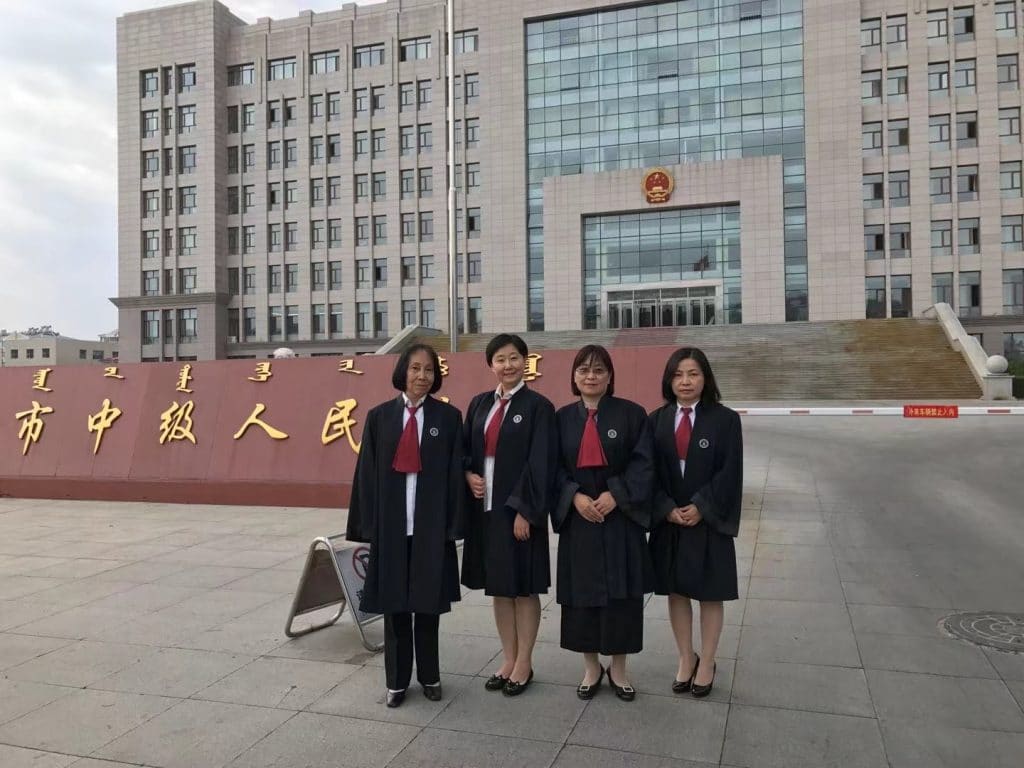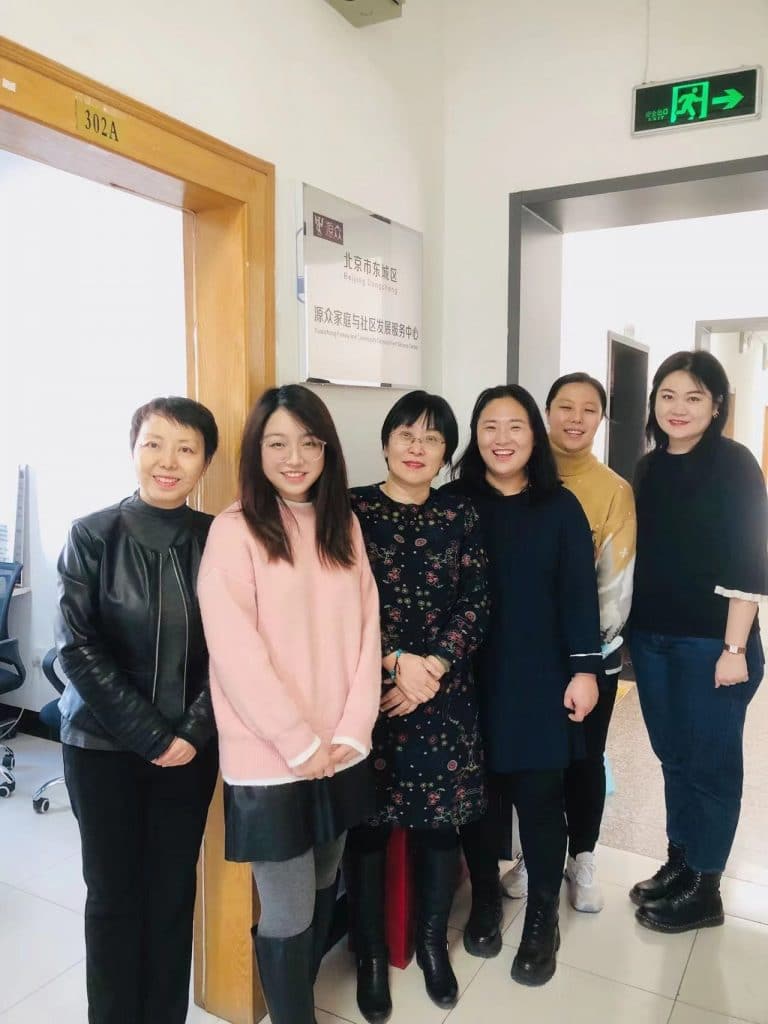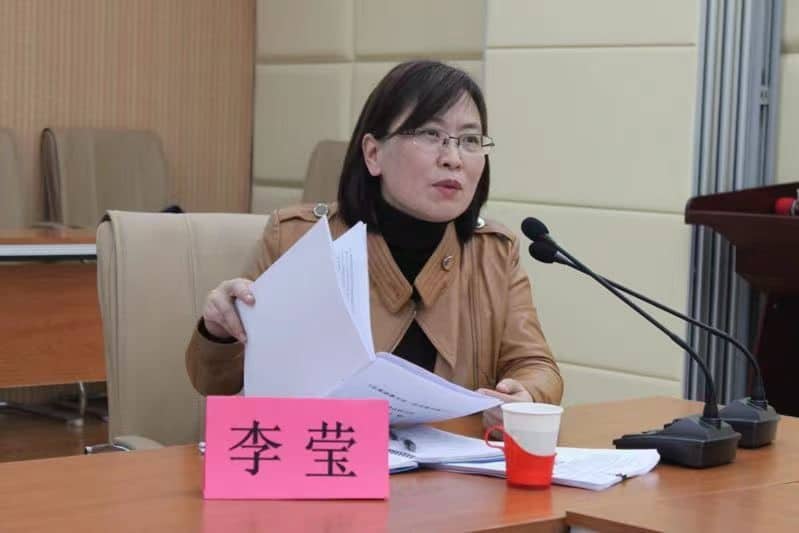From Fang Si-Qi’s First Love Paradise by Lin Yi-Han to Know My Name by Chanel Miller and Black Box by Japanese journalist Shiori Ito, Li Ying always prepared multiple copies of the same books on her shelf.
“The extra copies are to be sent to the judges of some of our cases — as supplementary reading materials to the legal opinion submitted,” Li said. Sexual harassment legislation is relatively new in China, so some judges were not trained or prepared for such cases. “Judges who are willing to constantly improve their professional skills often would read these books.”
Li, after two decades fighting for women’s legal rights in China, is still busy every day juggling her multiple roles as the director of Beijing Yuanzhong Family and Community Development Service Center, a partner at Zhenbang Law Firm, executive director of the Women’s Law Research Association of Beijing Law Society, and more.
“For thousands of years, many have sacrificed their lives fighting for women’s rights. Lots of people nowadays might not realize that even the slightest improvement in gender equality comes from long-term, joint efforts by many practitioners in this field,” Li told CDB in a recent interview. “I suggest that everyone who wants to contribute takes a more down-to-earth approach and starts with the people around them.”
Beijing World Conference on Women
Li was born and raised in Yuanling County, Hunan Province, where “hardworking women undertake all kinds of housework as well as manual labor outside of the home — but still get treated badly at home or even suffer from domestic violence on a regular basis.”
“Growing up, I just couldn’t understand how unfair the general situation was to women, and deep down inside my heart I really wanted to help,” Li told CDB in a recent interview.
After graduating with a degree in economics, she worked as a civil servant when the Fourth World Conference on Women was held in Beijing in 1995.
She still remembers how impressed she was merely by watching the conference participants from around the world on TV — the confidence of those women despite how they looked and what they wore. She also became obsessed with all the panel discussions from the “NGO Forum on Women” — a branch venue of the conference that took place in Beijing’s Huairou County — though she hadn’t heard the word “NGO” before.
“It’s all over the news, and I paid so much attention to what was going on every day though it was not directly related to my job at that time,” she said.
Impressed by speeches from the conference, Li started to research and learn more about the non-profit sector, women’s rights, domestic violence, and other related topics.
In 1998, after staying up late studying for months, Li officially qualified as a lawyer. “My daughter almost didn’t recognize me because I was hardly at home during that period,” she said.
In two years, she was admitted to Peking University for a master’s degree in civil and commercial law, where she first came across the Beijing University Law School Women’s Legal Research and Services Centre, one of the first NGOs specializing in women’s legal aid in China.
“I still remember my writing test to get to work for the center was about women’s rights and legal aid, and I had to bury myself in Beijing’s Xidan Book Building to educate myself on legal aid before turning in the draft,” Li told CDB.

Legal aid to start with, but there’s more to it
The first few cases Li came into contact with after joining the center shocked her deeply: a domestic violence survivor with a broken arm covered under a stained bandage couldn’t get legal aid for months, another woman who was beaten by her husband had to leave an open wound on her stomach because she couldn’t pay for proper treatment, not to mention seeing photos of domestic violence victims who were brutally killed.
“At first, I cried a lot, I couldn’t help offering them money, and I had trouble falling asleep at night,” she recalled. But she was also deeply motivated to offer help to women across the country — completely changing their lives in some cases.
“I loved my job there, for we not only provided legal aid for women but also pushed for legislation to protect women’s rights,” she explained.
During the process of providing direct legal aid to fund the cases, they were able to identify problems, conduct further research, and launch pilot projects. Eventually, they submitted legal opinions as part of their legal advocacy to make changes and improvements in related legislation, including amendments to China’s Marriage Law and the Law on the Protection of Women’s Rights and Interests, which for the first time included the prohibition of sexual harassment in its 2005 revision.
Her extensive legal aid experience also made Li aware of the more nuanced needs of domestic violence and sexual assault survivors, including mental health support, accommodation, and child care. In 2011, she founded Beijing Yuanzhong Gender Development Center, which was officially registered as a social organization in 2015 under the name Yuanzhong Family and Community Development Service Center.
Yuanzhong: a supportive hub
In addition to providing legal aid services and submitting legal opinions to push for legislation around gender-based violence, Yuanzhong looks to offer more comprehensive services to address the diverse needs of victims of gender-based violence.
Domestic violence cases for example can be very complicated: some of the victims need financial support for medical treatment, while others need shelter and psychological support, Li said.
“Social organizations can intervene and offer necessary support throughout the whole process,” she said, and problems may arise at all stages during the process of intervention. The implementation of the relevant laws is inadequate, the design of the current legal services needs to be improved, and the relevant personnel who handle the cases often lack enough knowledge and tend to misunderstand the concept of domestic violence.
The purpose of setting up Yuanzhong, according to Li, was to explore the establishment of a victim-oriented system that combines shelters, psychological support, legal services, social work and other integrated services.
“Restart — Women’s Support Group”, Yuanzhong’s signature project, seeks to enable victims of gender-based violence to break the situation of isolation from others and to rebuild confidence through a respectful and supportive group atmosphere. The support group held courses on understanding the concept of domestic violence and anti-domestic violence laws, as well as activities such as ice breakers between group members and the drawing of self-portraits and family trees.
In 2016, Yuanzhong partnered with the Amity Foundation to launch the Emergency Relief Fund for victims of gender-based violence, a fundraising effort bringing in 2 million yuan ($314,164) — having provided financial support to nearly 300 women to assist with legal fees, living allowances, medical expenses and psychological support.

Adapt to changing circumstances
“Project execution can be very challenging,” said Tian Ping, a program officer at Yuanzhong. “The victims themselves, with various needs, may constantly change their minds, not to mention the difficulties coordinating with public authorities.”
As with many other social organizations, funding is also a big challenge, with financial problems often causing talented professionals to leave the sector, she added. To diversify its sources of funding, Yuanzhong was registered last year as a social enterprise. For those that stay like Tian, they’re inspired by Li’s work and motivated by the chance to fight for a better future for women by helping those in need.
“I was very anxious a couple of years back when we started to lose our funding and staff due to policy changes, but I’ve stopped worrying now because it’s meaningless. We just do what we can and try our best,” Li said.
The organization currently runs with a core team of seven full-time staff as well as a group of volunteers and advisors — about 200 lawyers, 20 psychologists and 50 experts in other fields.
After the Anti-Domestic Violence Law, China’s first law dedicated to preventing and stopping domestic violence, which came into effect in 2016, Yuanzhong launched its anti-domestic violence training program for other social organizations, especially grassroots ones.
More than 160 training sessions have now been held, covering topics including the basics of domestic violence, the anti-domestic violence law, and intervention methods — with the goal of equipping more social organizations and social workers with professional domestic violence intervention skills and unifying the service standards of social organizations based on their own experience.
“But our organization alone can only do so much,” Li said. In the long run, she hopes to engage more social organizations across the country to form a larger alliance to fight against gender-based violence.
As an exploration of cooperation between social organizations and enterprises, Yuanzhong and Avon jointly launched the Avon × Yuanzhong Anti Gender-based Violence Hotline (177-0124-2202) on March 10, and they also plan to launch online courses and host live broadcasts aiming to raise public awareness of gender issues.




